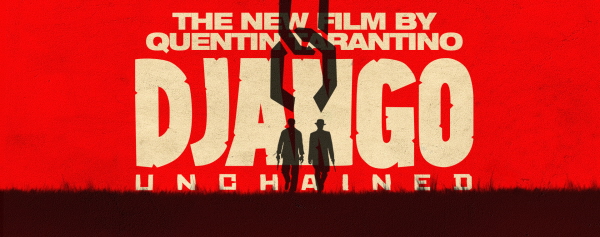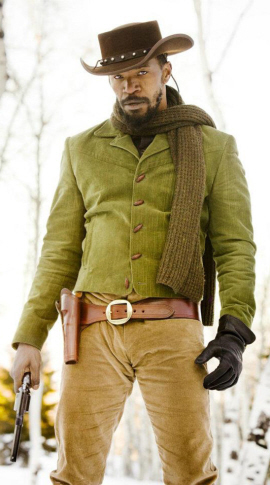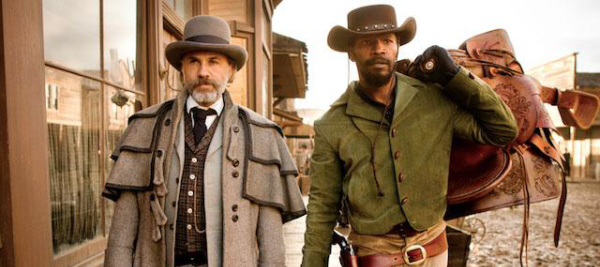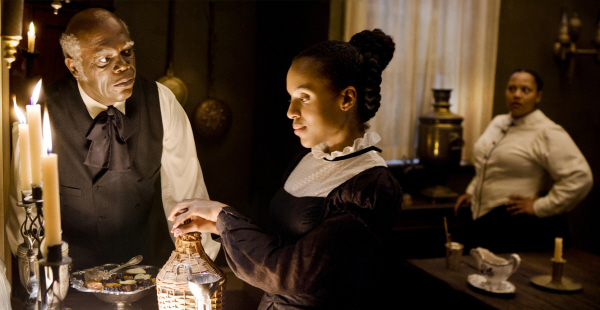I wrote most of this before last Friday’s terrible tragedy. I’m leaving the review intact as a means of being true to my original interpretation of this fictional film and its very fictional and exaggerated violence. If at anytime you find the review insensitive, please know that it was not my intention. The tragedy in Newtown is weighing very heavily on my mind and will continue to in the coming weeks and months. Deconstructing my fiction, however violent, tends to make my reality slightly more livable. As Hyman Roth once said, “This is the business we have chosen.” -TK

It’s getting harder to review Quentin Tarantino films, if only because it’s feeling increasingly as if he’s making movies with my precise sensibilities in mind. When Django Unchained blasts out of the chamber and into the minds of theatergoers this Christmas, I’ll have a hard time believing I’m the only one feeling that way.
Django Unchained is cinematic free basing. The kind of hit that puts you in another world only to leave you jonesing and restless at 3AM, wondering where you can score more of it. The beauty of a new Tarantino joint (as Renn is eloquently pointing out) is the cinematic windows his works tend to open. Characters, genres, filmmaking styles, all sorts of iconography crammed into the mind’s eye of this brilliant director; then filtered back out like a prism – submitting a work that’s creatively original with the familiarity and comfort of a warm blanket. Granted, because this is Tarantino we’re talking about, the blanket’s only warm because it’s been doused in buckets of fresh blood and entrails.
 By its own admission, Django Unchained is a racially charged film. Tarantino makes a wise choice where violence is concerned. The “blood and guts” cartoonery of Kill Bill is there in spades, but that light-hearted approach to violence is offset with realism when inflicted on slaves. These scenes of honest brutality, wince-inducing and disturbing though they may be, are there for a reason. The director, assisted by the brilliant Robert Richardson’s lens, elicits the right emotional responses at the right moments, so much so that the disparity is barely noticeable when immersed in the experience. There’s nothing more troubling than the deeds evil men do, but nothing more rewarding than watching their intestines splayed from their bodies and lit up in the bright southern sun. When bad guys meet the business end of a gun, Django becomes something of a romp.
By its own admission, Django Unchained is a racially charged film. Tarantino makes a wise choice where violence is concerned. The “blood and guts” cartoonery of Kill Bill is there in spades, but that light-hearted approach to violence is offset with realism when inflicted on slaves. These scenes of honest brutality, wince-inducing and disturbing though they may be, are there for a reason. The director, assisted by the brilliant Robert Richardson’s lens, elicits the right emotional responses at the right moments, so much so that the disparity is barely noticeable when immersed in the experience. There’s nothing more troubling than the deeds evil men do, but nothing more rewarding than watching their intestines splayed from their bodies and lit up in the bright southern sun. When bad guys meet the business end of a gun, Django becomes something of a romp.
Those boundaries of evil, not confined by race in the film, still use the sociopolitical topic as a major driver in this slavery-minded revenge pic. If money and bigotry were motivators in the prominence of slavery, indifference and complacency kept it trucking for an ungodly amount of years. All of those factors are present in Django. Would it surprise you to learn that the strongest antagonist in the film is a black man? Or the most compassionate and progressive character is a German played by Christoph Waltz?
Indeed, 2012 sees Sam Jackson give one of the best performances of his career. It’s a reminder of just how capable a performer he is when a director is able to coax it out of ol’ Mace Windu. Jackson disappears into his role of crotchety old slave Stephen, the most trusted servant in all of Calvin J. Candie’s (Leonardo DiCaprio) “Candieland” plantation. I couldn’t stop from smiling when Jackson first appeared on screen, as it’s readily apparent that the goods were indeed about to be brought.
I’d like to think Tarantino wrote Dr. King Schultz as something of a redemption for Christoph Waltz the actor, allowing him to play “the good German” after directing him to an Oscar as despicable Nazi Hans Landa in Inglourious Basterds. Freeing Django (Jamie Foxx) and teaching him the mercenary trade, Schultz’s relationship with his new ward represent a large aspect of what makes Django so goddamn watchable. Tarantino and his performers imbue these men with honest to god character progression throughout, making both their relationship and their fates all the more rewarding as we follow them through the bowels of Southern slavery.

Tarantino’s films are rewarding to interpret socio-politically due in part because of how apolitical his artistry really is. There are messages in Django. But those messages don’t give 2/3rds of a shit about anything on in Capitol Hill. It’s morality, revenge, and one badass dude’s unleashing close to 90 years of deep-seated resentment and hostility towards an abominable system and the men culpable in its prolonged survival.
That one badass dude is played by Jamie Foxx. Django is an archetype through and through, so while there are shades of a real character layered onto him, he’s also the everyman we’re rooting for. The writing serves its anti-hero, but this is a performance Foxx can tap dance the script notes of in Morse code. Not to take away from the performance or the character, just that Django is everything he needs to be and not an ounce of fat more. He’s eminently recognizable among the pantheon of great leads in westerns, but also spends the movie shedding character traits to become the film’s “one in ten thousand n*gga.”

Speaking of which, similar to how the writer/director laced Pulp Fiction with all manners of “fuck”, Tarantino drops N-bombs in the film like the phrase is going out of style (and hopefully it is). People looking to be offended will find plenty to grab onto, but the language is certainly true to the real-life history and themes the filmmaker is spinning into his fantasy.
I don’t know if I had a sense of Django Unchained being overlong when I was watching it, but Tarantino crams a whole helluva lot of movie into those 165 minutes. One sequence people might take issue with, if only after the fact, stretches on for almost a third of the film. And it makes for a slight disconnect as the film transitions from a very gratifying buddy western and an exceedingly sublime revenge piece.
 But it’s also an excuse for DiCaprio to do magnificent work as Candie, perhaps the actor’s boldest contribution to date. Equally great is Kerry Washington’s Broomhilda Von Shaft (Von Shaft!). Besides being Django’s wife, the character is graced with all manner of interesting personality quirks that flesh out a fascinating backstory. Washington’s is a performance that doesn’t pull any punches. The fear her eyes convey is painstakingly palpable.
But it’s also an excuse for DiCaprio to do magnificent work as Candie, perhaps the actor’s boldest contribution to date. Equally great is Kerry Washington’s Broomhilda Von Shaft (Von Shaft!). Besides being Django’s wife, the character is graced with all manner of interesting personality quirks that flesh out a fascinating backstory. Washington’s is a performance that doesn’t pull any punches. The fear her eyes convey is painstakingly palpable.
In truth, there are so many great performances scattered about that I’m doing a disservice not listing them all, though I’d be remiss if I didn’t point out that this is a film where even Don Johnson does phenomenal work. Don. Johnson.
Robert Richardson’s cinematography is everything you’ve come to expect from his previous works with Tarantino, as he transitions between bathing his film with deep hues and drab grit as the story dictates. This is a film that gives you a lot of looks. Unfortunately, it’s housed within a slightly exaggerated run time that, while not a dealbreaker in and of itself, makes me wonder what Sally Menke would have done with it. Tarantino’s go-to editor unexpectedly died in 2010 and, while Fast Five‘s Fred Raskin keeps the film consistent with his director’s filmmography, Menke’s guiding hand is undoubtedly missed.
Quentin Tarantino didn’t waste any time following up his equally brilliant Inglourious Basterds with another in a shoebox of filmic love letters. Fans of the artist will find everything they love about the director present and accounted for in Django Unchained, as there’s plenty to love. Kinetic, colorful, powerful and crowd-pleasing in a way few films are, Django Unchained is that “one in ten thousand” film.
Rating: 




Out of a Possible 5 Stars